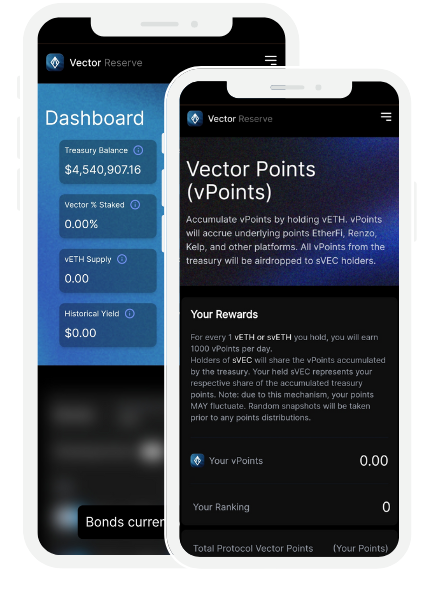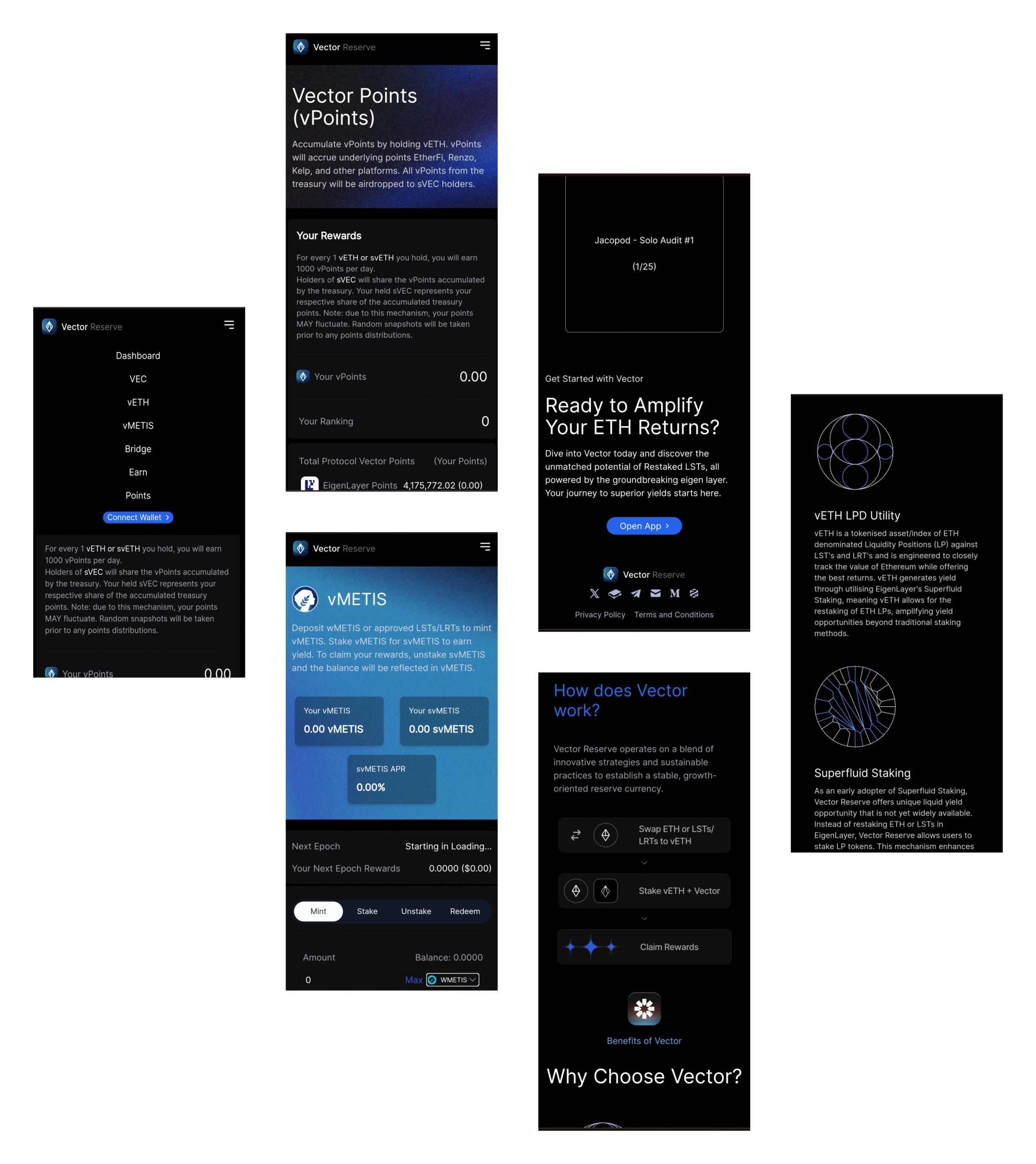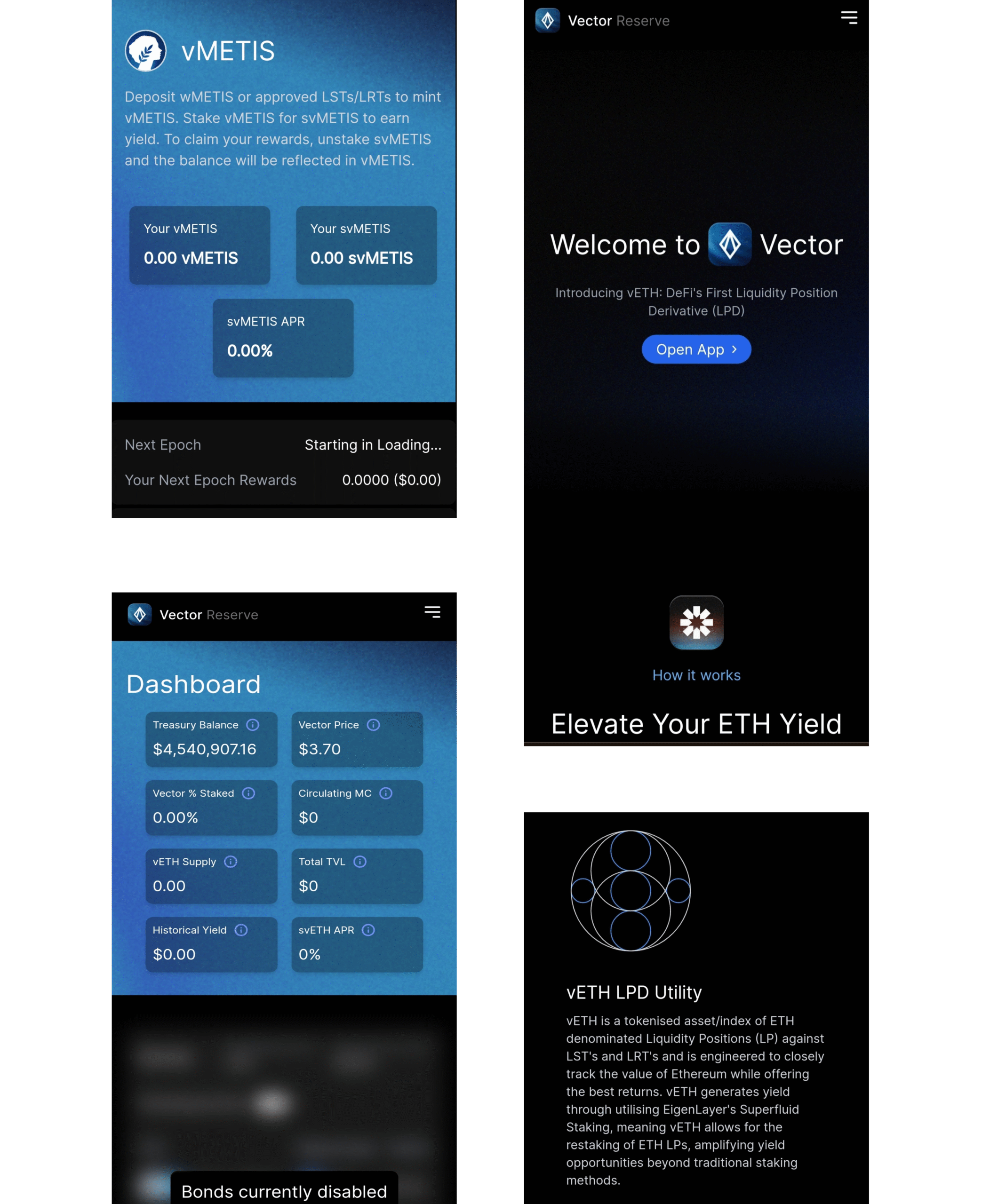
Vector Reserve’s VETH decentralized application, accessible at vectorreserve.com/dapp/veth, is an innovative platform designed to revolutionize the financial ecosystem by integrating blockchain technology. The VETH dApp focuses on providing users with Decentralized Financial Services that ensure transparency, security, and efficiency.

The client aimed to develop a decentralized application that leverages blockchain technology to offer a secure and transparent financial ecosystem. The primary requirements included creating a robust and scalable infrastructure capable of handling a large number of transactions efficiently. The platform needed to ensure high levels of security to protect user data and financial assets.
Additionally, the client required the dApp to provide a user-friendly interface that caters to both experienced users and newcomers to the blockchain space. Interoperability with other blockchain networks was essential to facilitate seamless transactions and integration with various financial services. These requirements guided the design and development of the VETH dApp, shaping its functionalities and overall user experience.

The platform features an intuitive interface with easy navigation, supported by tutorials and guides, making it accessible and straightforward for both beginners and advanced users.
The VETH platform features an intuitive interface, simplifying navigation for all users. Step-by-step tutorials and guides help beginners and experts easily understand and utilize the dApp’s functionalities and financial services.
VETH uses advanced cryptography and multi-layered protocols to safeguard user data and assets, with regular audits and updates to maintain strong protection against threats.
VETH supports multiple blockchain networks, enabling seamless cross-platform transactions and integration with external financial services, broadening the platform’s flexibility and usability.
Smart contracts automate processes to ensure efficient, accurate transactions, reducing manual errors and boosting platform reliability through self-executing, trustless agreements.
All transactions are immutably recorded on the blockchain, providing verifiable proof of activity, enhancing transparency, trust, and encouraging active user engagement.

VETH dApp uses Proof of Stake, selecting validators based on their staked tokens. This method lowers energy use and boosts security by aligning validator incentives with the network’s overall health.
VETH dApp blends PoS and DPoS into a hybrid consensus model. This fusion ensures enhanced decentralization, security, and transaction speed, offering a scalable and high-performance blockchain ecosystem.
Stakeholders participate in a transparent voting system, electing delegates to maintain the blockchain. This democratic process fosters accountability, giving the community control over validator selection and network governance.
The platform uses Delegated Proof of Stake, where token holders vote for trusted delegates. These delegates validate transactions, offering improved speed and efficiency while maintaining the core security benefits of PoS.
Validators earn staking rewards based on their stake and performance. These incentives ensure active validator participation, reinforcing the network’s security, stability, and continued engagement from token holders.
Validators are chosen by the size of their stake and community votes. This ensures those securing the network are trusted, motivated, and aligned with the platform’s performance and reliability goals.

Aa Bb Cc Dd Ee Ff Gg Hh Ii Jj Kk Ll Mm Nn Oo Pp Qq Rr Ss Tt Uu Vv Ww Xx Yy Zz
Approach The project followed a structured approach to ensure the successful implementation of the VETH dApp. The initial phase involved a comprehensive analysis of client requirements and market research to understand the competitive landscape. This was followed by the design and architecture phase, where a scalable and secure architecture was developed to support the desired features. The development phase employed an iterative process with regular feedback loops to incorporate client and user feedback, ensuring that the platform met all requirements and expectations.
Results The VETH dApp achieved significant milestones post-deployment. The platform witnessed rapid adoption within the blockchain and financial communities, reflecting its robustness and appeal. Performance metrics indicated high throughput and low latency in transaction processing, meeting the scalability requirements effectively. The security measures proved effective, with no major security breaches reported, underscoring the reliability of the implemented protocols. User feedback was overwhelmingly positive, with high satisfaction regarding the intuitive interface and seamless functionality
Future Prospects With its strong foundation and innovative features, the VETH dApp is well-positioned for future growth and expansion. The platform continues to evolve, incorporating new technologies and features to enhance its capabilities further. Ongoing research and development efforts focus on improving scalability, security, and user experience, ensuring that the VETH dApp remains at the forefront of decentralized financial services.

One of the core challenges during the development of the VETH dApp was ensuring scalability. The system needed to manage thousands of transactions per second without losing performance or efficiency. Solving this required innovative ideas, optimized infrastructure, and advanced blockchain design. By combining scalable consensus methods with architectural improvements, the team successfully handled demanding workloads. Their efforts enabled the VETH dApp to maintain reliable throughput, supporting seamless decentralized transactions for users across the growing blockchain ecosystem.
Building the VETH dApp with strong security was another serious challenge. Protecting against attacks and safeguarding transactional data required robust cryptographic solutions and carefully layered defenses. The team established proactive monitoring, encryption protocols, and multiple verification mechanisms. To enhance resilience, regular audits, penetration tests, and code reviews were performed. These steps identified risks early and minimized exposure. Through cryptography, disciplined design, and constant improvements, the VETH dApp delivered a dependable and trustworthy platform capable of securing user confidence.
Integrating the VETH dApp with external blockchains and traditional systems introduced major complexities. Maintaining seamless interoperability and stable data exchange required tackling compatibility issues, scalability concerns, and integration gaps. The team implemented modular frameworks and designed flexible APIs to simplify adaptation. This approach enhanced communication across diverse networks while ensuring reliability. By addressing integration hurdles directly, the VETH dApp achieved greater accessibility and functionality, empowering organizations and users to connect effortlessly within both decentralized and traditional ecosystems.

The VETH dApp utilized a diverse set of technologies to meet its objectives..